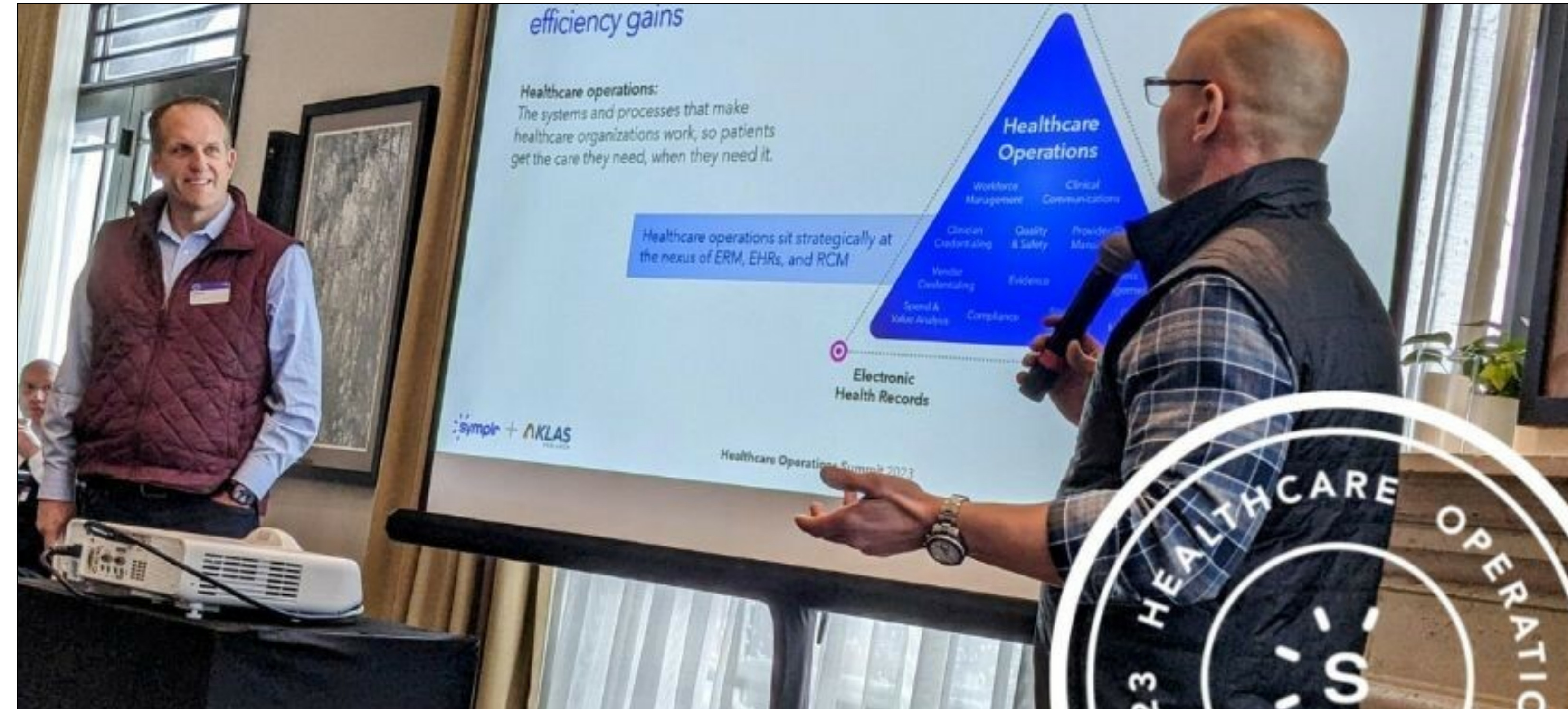
As the challenges for healthcare organizations continue to mount in staffing, financial, regulatory, and other areas, leaders are strategizing about how to survive and thrive. With that goal in mind, a recent “think tank” addressed how to do more with less, maximally using staff and technology to bridge gaps and increase efficiency. The centerpiece? Healthcare operations.
A first-of-its-kind event, the 2023 Healthcare Operations Summit delivered a comprehensive mapping and assessment of healthcare operations, and set a blueprint for its future. The takeaway is straightforward yet extraordinary: Make meaningful improvements in healthcare operations that create ripple effects in numerous areas of the health system, ultimately creating better outcomes for patients, providers, staff, and the organization.
Among health systems and payer organizations, symplr has established itself as the pioneer and leading provider of healthcare operations solutions and services. Decades of experience have steeled symplr’s partnerships with health systems and health insurance companies, setting the stage for the 2023 Healthcare Operations Summit. With help from partner KLAS Research, this event brought together executives with widespread influence in U.S. healthcare. In fact, the 2023 Healthcare Operations Summit attendees collectively represented:
- 26 organizations across 32 states
- 400 hospitals
- 64,000 hospital beds
- 350,000 healthcare employees
- More than $100 billion in revenue
Several summit attendees also participate on symplr’s Executive Customer Council, formed in 2021 to drive a strategic vision for enterprise healthcare operations.
See the Healthcare Operations Summit participants in action in this brief video.
What are healthcare operations?
Healthcare operations are the systems and processes that make healthcare organizations work so patients get the care they need, when they need it. This area of healthcare is growing rapidly in importance and sits strategically at the nexus of electronic health records, enterprise resource management, and revenue cycle management. Healthcare operations encompasses provider data management; workforce management; compliance, quality, and safety; and contract and supplier management.
For decades, symplr has been committed to providing better outcomes for patients, providers, payers, and staff by unifying the management of many facets that comprise healthcare operations.
Healthcare leaders from organizations nationwide participated in sessions, with the goal to improve healthcare operations.
What did the first Healthcare Operations Summit accomplish?
Hosted by symplr and featuring presentations by KLAS Research experts, the summit in Park City, Utah, took place February 28 through March 1 and opened with an evaluation of urgent challenges, such as financial pressure, clinician turnover/burnout, compliance adherence, and safety issues. Notably, these issues can be directly and rapidly addressed through improvements in healthcare operations.
symplr’s clinical Leaders led key discussions at the summit. Pictured left to right: Angel Mena, MD, Chief Medical Officer; and Karlene Kerfoot, PhD, RN, FAAN, Chief Nursing Officer.
Data from two recent surveys—one by KLAS and Bain & Company, and the other by symplr— was presented, reflecting the current sentiment of hospital CEO, CIOs, and other leaders:
- Health systems and payers are eager to find sustainable technology and software solutions to address macroeconomic issues
- 95% of providers say they are doubling down on software investments to address rising margin pressure and constrained labor
- 35% of providers plan to spend more than usual over the next 12 months
- 40% said financial pressure is their top threat in the coming year, followed by clinician burnout/staffing challenges (31%), and cybersecurity/patient privacy (22%)
Winning technology must address financial health, create better communication and have a connected/enterprise-wide architecture to ultimately deliver patient-centric care
Participants’ rich discussions during the summit delved into ways to use unified healthcare operations technology and software to address the four primary areas of healthcare operations (see sidebar). A literal “Big Idea Board,” complete with giant Post-it® notes, was the canvas attendees used to gather and hone their ideas for shared best practices.
What attendees said about the first Healthcare Operations Summit:
- "[It was an] opportunity to interact with peers representing other components of operations in a healthcare institution to discuss challenging matters—but with no one having to worry about defending their turf or revealing information that could be used to weaken their position in the future.”
- "Being able to meet symplr's executive team and express our unique, specific needs was important in providing an optimistic foundation for future collaboration."
- "The collaborative team discussions were insightful and informative.”
Next step: A pledge to continually improve healthcare operations
As a result of feedback from the 26 organizations represented, we created a sweeping pledge that participants and others can sign committing to continuously advancing healthcare operations for the betterment of health systems. In essence, they’ll commit to addressing stressors on healthcare systems that have exposed operational inefficiencies by making improvements to their healthcare operations processes, technology, and/or software. Their actions will help shape healthcare operations today and in the future, and their ongoing collaboration will put the following key ideas into action at their organizations and beyond:
- Unify and standardize healthcare operations tools, data reporting, and analytics for decision making—ensure we are getting [close-to] real-time, valuable insights from our data
- Leverage technology that supports and strengthens an exhausted healthcare workforce and that takes into account the user’s perspective in its development and deployment
- Build a dynamic and reliable source of truth for provider data
- Create a patient access and loyalty ecosystem that exceeds the expectations of today’s transient healthcare consumer
- Leverage proven innovation and automation to streamline care and operational efficiency
It’s never been more crucial for healthcare organizations to streamline and improve operational performance. While the challenges are complex and the repercussions of inaction are bleak, there are proven steps the industry can take to improve healthcare operations in a way that will create impactful change in each of the challenges listed above. The 2023 Healthcare Operations Summit delivered the call to arms for all healthcare organizations to join in that essential journey.
